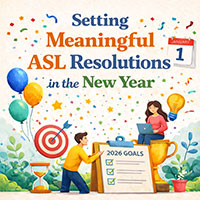
The Role of the Interpreter in the Classroom
Recently I sat down with a deaf high school student to discuss how things were going with her classes and her interpreter. She told me that her interpreter was doing well in her 1st hour class, but she said she was bored in her 2nd hour class because her interpreter was not "doing a good job there." I know this interpreter well and had observed her many times before. I have always known the interpreter to be very professional, so I decided to observe (unannounced) both 1st and 2nd hour and see if I could observe a difference.
The difference the deaf student was experiencing between the two hours was not the fault of the interpreter; it was a difference between the teaching styles of the two teachers. The interpreter was, in fact, doing a great job in both classes at conveying the style and the atmosphere of both classes. The first hour teacher was dynamic and the second hour teacher was dry and lackluster. I made sure to let the deaf student know that the information was being presented accurately in both situations.
There is a Code of Professional Conduct that interpreters must follow. This code was developed by the National Association of the Deaf (NAD) and the Registry of Interpreters for the Deaf (RID) to set high standards of professionalism and ethical conduct for interpreters. The interpreter was in fact doing her job very well and it would have been against the Code of Professional Conduct for her to alter the message from either teacher. The Code states that interpreters must "render the message faithfully by conveying the content and spirit of what is being communicated" (Tenet 2.3) and "refrain from providing personal opinions" (Tenet 2.5). By interpreting the first hour lesson more dynamically and the second hour lesson more lackluster, the interpreter was staying true to the content and spirit of what was communicated from each teacher, which is exactly what a good interpreter is supposed to do.
This is a unique problem I am sure many deaf students, interpreters, and administrators experience on a regular basis. Interpreters should stay true to the Code of Professional Conduct and interpret the message as it is conveyed. Situations like these can also be good educational opportunities. The majority of deaf children have hearing parents, so they may not be aware of deaf rights like the Code of Professional Conduct for interpreters, which not only sets standards for interpreters to follow, but helps to protect the deaf consumer. Explaining that the interpreter was accurately conveying the message of the teachers and introducing the student to the NAD-RID Code of Professional Conduct can help the student to better understand the role of the interpreter in the classroom and their rights as a deaf consumer.
Resources:
ADVERTISEMENTS








Savvy User RuthThursday, July 2, 2015
I just learned something new. Not about the code of conduct.
About the way in which an interpreter is to project the personality of the person in which she or he is interpreting from, as well as just what he or she is saying.
That makes all the sence in the world. I just didn't realize it went that deep.
It makes me want to go bck to get certified and become an interpreter. Lol
This is a great educational piece as well as an interesting read.
RC